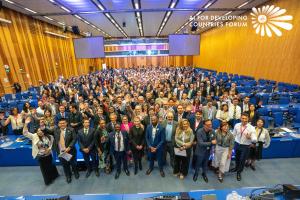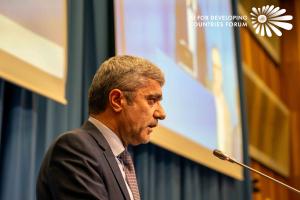United Nations Vienna Opens AIFOD 2025 Summer Summit

Distinguished speakers and delegates from six continents gather at the United Nations Office at Vienna for the AIFOD 2025 Summer Summit, where global leaders unveiled transformative frameworks to redirect AI investment toward the Global South.
NY, UNITED STATES, July 30, 2025 /EINPresswire.com/ -- The AI For Developing Countries Forum (AIFOD) Vienna Summit 2025 at the United Nations Office at Vienna launched a transformative initiative addressing the stark reality that the Global South receives less than 1% of global AI funding despite representing 80% of the world's population. Distinguished speakers from six continents united under the theme "AI's Unequal Future" to unlock AI's trillion-dollar opportunity for equitable development.
The summit opened with a powerful declaration: "We gather at a critical moment—when the AI revolution risks becoming history's greatest amplifier of inequality. The Global South receives less than 1% of global AI funding, while 2.6 billion people remain offline. But we're not here to lament—we're here to act."
Dr. Wendy O'Brien from UNODC challenged conventional economic thinking about AI development, explaining: "The staggering scale and pace of financial investment in AI risks obscuring the other forms of investment simultaneously demanded – investments in energy, water, land conservation, data governance, and human dignity." She posed the critical question: "What return is there for the world's majority who are not financially invested in Big Tech?"
Andrea A. Jacobs from Antigua and Barbuda's Ministry of Legal Affairs demonstrated how smaller nations can become AI policy leaders through regional cooperation. "Small island states and developing nations are proving that innovation comes from necessity, not just capital," Jacobs emphasized, outlining strategies for Caribbean nations to amplify their collective influence in global AI governance.
His Excellency Mr. Idibek Kalandar, Tajikistan's Permanent Representative to the United Nations in Vienna, showed how landlocked developing nations can leverage AI for economic diversification and regional connectivity, overcoming traditional geographic limitations through digital sovereignty initiatives.
The pivotal roundtable "Rewriting AI's Unequal Future" brought together public and private sector leaders. Lorenzo Larini, CEO of MINT, noted: "Last year, over 300 billion dollars were invested into AI, yet less than 1% reached the Global South," presenting contrasting scenarios of half-trillion-dollar GDP losses versus $1.2 trillion in new GDP potential by 2035.
Richard Malcolm Simbil from Papua New Guinea's Ombudsman Commission highlighted unique challenges of governing AI across 600 islands with 800 languages. "How do we deploy AI responsibly when most citizens live in rural areas with limited services?" he asked, demonstrating the complex reality facing most developing nations.
The "New Evaluation Frameworks" roundtable forged new metrics for Global South AI returns. Derrick T. Davis from University of Maryland Baltimore County challenged fundamental assumptions: "We need a measurement framework that takes into account the complexity of the global system," advocating for metrics beyond GDP that incorporate human, cultural, and environmental capital.
Abasiama Idaresit from Wild Fusion demonstrated how inclusive AI creates competitive advantages by extending technology to overlooked segments, "indirectly opening up your customer base, creating a much bigger market." Heather Wokusch from blockhub.care explored innovative financing mechanisms where "ROI also has to be social investment," outlining emerging models including decentralized finance platforms.
Davis delivered a keynote on the tension between rapid AI deployment and sustainable infrastructure: "We are all rushing fast to get technology, going at the speed of light, and we're not thinking about the scaling portion of it." He emphasized that successful AI implementation requires strategic decisions about timing, scope, and security rather than pursuing the fastest deployment.
Obadare Peter Adewale moderated the regulatory sandbox panel, explaining: "The only way we can create value is to put in place environments where innovators can experiment and test," citing Nigeria's successful tech ecosystem that produced five unicorns through adaptive frameworks.
Evening sessions tackled open source AI development and workforce partnerships. Simon Hardy from CitizeAi and Sara Michelazzo from Thoughtworks explored funding models breaking Big Tech's control over advanced AI, while Stefan Winzenried from JANZZ examined platforms ensuring no worker is left behind in the digital economy.
The summit achieved breakthrough frameworks addressing investment paradigms, regulatory innovation, and community-centered development. Key accomplishments include new investment models demonstrating how inclusive AI creates sustainable prosperity, successful sandbox models from Nigeria to Papua New Guinea, a global coalition unified around equitable AI development, and evidence-based approaches for measuring AI impact beyond traditional metrics.
The summit solidified AIFOD's role as the leading platform for transforming AI inequality into opportunity, building on four editions of groundbreaking dialogue and action. This second year in Vienna brought together an unprecedented coalition—from United Nations leadership to grassroots innovators—creating practical pathways for equitable AI development. The discussions revealed an undeniable truth: while developed markets show signs of saturation, the Global South is experiencing unprecedented AI growth rates that triple those of traditional tech hubs.
This fourth edition proved that the future of AI lies not in concentrating power among the few, but in democratizing access for the many. The summit's momentum carries forward a vision where artificial intelligence becomes humanity's shared tool for progress rather than a wedge driving societies apart. Through innovative funding mechanisms and collaborative frameworks, the path forward transforms the digital divide into a development dividend for all.
Dawid Wiktor
MEDIASCOPE
+43 1 4420113
email us here
Legal Disclaimer:
EIN Presswire provides this news content "as is" without warranty of any kind. We do not accept any responsibility or liability for the accuracy, content, images, videos, licenses, completeness, legality, or reliability of the information contained in this article. If you have any complaints or copyright issues related to this article, kindly contact the author above.


